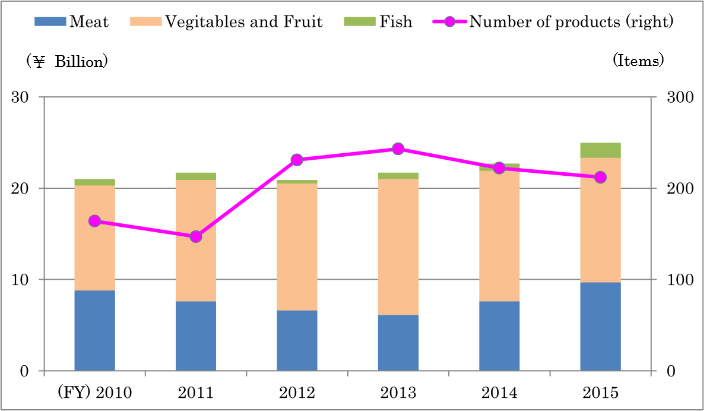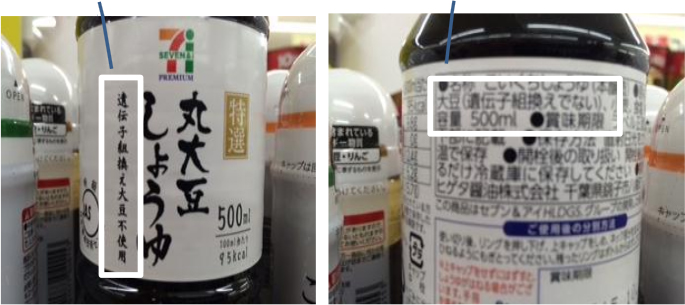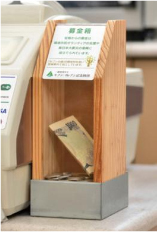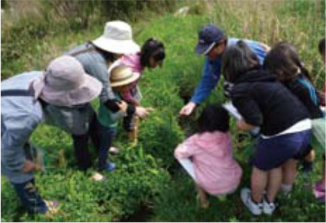- Top
- Sustainability
- Index for Researchers
- 07environment
- Preserving Biodiversity
- Sustainability
- Statement
- Message from the Representative Director & Executive Chair (Kaicho)
- Basic Policies of Sustainability Initiatives
- Sustainability Management
- Stakeholder Engagement
- Business Partners
- Seven & i Holdings Material Issues
- Compliance
- Information Security and Personal Information Protection
- Human Rights Initiatives
- Human Capital Initiatives
- Responses to Climate Change (TCFD) and Nature (TNFD)
- Response Based on the Taskforce on Climate-related Financial Disclosures (TCFD)
- Taskforce on Nature-related Financial Disclosures (TNFD)
- Social Contribution Activities
- Disaster Reconstruction Support
- Disaster Assistance
- Overseas Initiatives
- Sustainability Data Book
- External Recognition and Awards
- SASB/GRI Index
- Index for Researchers
- Keyword search
- Editorial Policy
- Social
- Environment
Preserving Biodiversity
Basic Policy on Sustainable Procurement
Seven & i Holdings has a basic policy on sustainable procurement.
Basic Policy on Sustainable Procurement
The world is faced with a variety of environmental problems such as depletion of natural capital and loss of biodiversity. Seven & i Holdings is working with various stakeholders based on the following policies* for continued business growth while maintaining the sustainability of the planet.
- Give consideration of biodiversity and cooperation for activities that support work to restore it.
- Eliminate trading in illegal natural capital and illegal logging and fishing.
- Give consideration to natural capital at risk of depletion.
- Promote and communicate traceability for agricultural, livestock and marine products and communicate information.
- *
- Amended to reflect changes in social conditions and new information.
Organic Products and Low-Agrichemical Products
We sell organic national brand products such as coffee and tea. In the fiscal year ended February 28, 2015, Ito-Yokado sales of organic products made up 0.5% of overall food sales.
At Ito-Yokado and York-Benimaru supermarkets, we sell private brand products made using reduced amounts of agrichemicals that are lower than the legal standard. Although these products are not completely organic, they are cultivated with reduced levels of agrichemicals and supplied with assured production areas and production history. At Ito-Yokado, annual sales of the "Vegetables and Fruit with Traceability" brand have reached ¥13.6 billion.
At Sogo & Seibu and Ito-Yokado, we sell towels and apparel made from organic cotton and pre-organic cotton (cotton grown in fields that have been practicing non-chemical cultivation for less than three years). At the Denny's chain of restaurants run by Seven & i Food Systems, the coffee menu includes organic selections.
Ito-Yokado Private Brands and "Vegetables and Fruit with Traceability" Standards
The methods and frequency of use of agricultural chemicals vary by region and crop. The "Vegetables and Fruit with Traceability" category at Ito-Yokado comprises foods grown with the goal of applying agrichemicals with half or lower of the usual frequency for each growing area (local government organizations and other public bodies stipulate the average number of applications for each crop). At our "Seven Farms," which are engaged in agriculture operations, and under our "Vegetables and Fruit with Traceability" brand, we aim to ensure safe agricultural produce, correct farm management, and so forth, and have acquired Japan Good Agricultural Practice (JGAP) certification.
JGAP is an agricultural production management method recommended by the Ministry of Agriculture, Forestry and Fisheries of Japan. It provides a set of standards to be followed in daily farm management to increase food safety and ensure environmental conservation. Since JGAP includes standards relating to "food safety" and "environmentally sustainable agriculture," the products sold under the "Vegetables and Fruit with Traceability" and Seven Farms brands use no more than the minimum necessary level of agricultural chemicals.
Five Promises of "Vegetables and Fruit with Traceability"
- Only stock domestically grown agricultural products.
- Producers who properly grow vegetables and fruit on suitable land are carefully selected from all over Japan.
- Products are delivered to customers under the name of each individual producer.
- Producers' discerning techniques and their personalities are introduced on the website and on sales floors.
- Agrichemical reduction targets are set and continuous checks are performed to detect agrichemicals and radioactive material.
Sales of"Vegetables and Fruit with Traceability" Products and Number of Products

JGAP Guidelines
Food Safety
- Management of soil, water and propagation materials
- Fertilizer management
- Plant protection product management
- Hygiene management during Harvesting and transport
- Produce handling
Environmentally Sustainable Agriculture
- Water conservation
- Soil conservation
- Consideration for surrounding lands
- Waste management, reduction and recycling
- Energy efficiency
- Environmental awareness and biodiversity
Rice Grown in Harmony with the Ecosystem
Ito-Yokado is selling a series of rice cultivated in consideration of environmental conservation and in harmony with nature. The cultivation not only uses less pesticide and chemical fertilizer, but also aims to conserve biodiversity by using rice fields that can serve as wildlife habitats. Ito-Yokado donates part of the sales of this product to a government organization engaged in improving the environment of the rice production areas. This initiative has been well received as a scheme that enables customers to support these efforts as well.
Rainforest Alliance
We sell certain national brand products that use materials certified by the Rainforest Alliance. For example, at Ito-Yokado, we offer ten items, such as Lipton tea leaves using Rainforest Alliance-certified tea leaves.
Fish
Although, Ito-Yokado currently does not handle fish certified by the Marine Stewardship Council or by the Aquaculture Stewardship Council, it sells fish under its own private brand, Fish with Traceability. Sales under the brand in the fiscal year ended February 28, 2015 were ¥1.95 billion, or just 2.9% of the overall sales for the seafood sector; however, Ito-Yokado plans to increase sales by adding new varieties of fish.
Criteria for "Fish with Traceability"
- Fish raised through aquaculture in Japan
- Traceability of feed, site environment, and producers
- Only the minimum necessary amount of pharmaceutical products used
- Independent certification of production environment, feed, pharmaceuticals, and other aspects
Support for Organizations Engaged in Environmental Activities
Support for NPOs and Other Environmental Organizations
Seven & i Holdings has long been a corporate member and supporter of WWF Japan, which is an environment and wildlife protection organization, and the Keidanren Nature Conservation Fund, which is involved in supporting the nature protection projects of various NGOs in and outside of Japan, as well as promoting wider awareness of biodiversity.
Seven-Eleven Japan has been conducting environmental contribution activities together with franchised stores through the Seven-Eleven Foundation since 1993.
Collection boxes are placed at the counters of Seven-Eleven Japan stores to collect contributions* from customers. These contributions are sent to the Seven-Eleven Foundation along with donations from Seven-Eleven Japan. The funds are used to assist environmental NPOs** through public aid as well as to support initiatives to prevent global warming, activities for protecting and conserving the natural environment, and other such efforts.
In addition to these support activities, the Seven-Eleven Foundation has been making efforts of its own to protect and conserve Japan's previous nature and ecosystems by operating a nature school. The Kujuu Furusato Nature School is located in Oita Prefecture. The school is working to preserve grassland environments, such as the Tadehara and Bougatsuru areas registered under the Ramsar Convention, and taking action to preserve grassland butterflies. It is also promoting efforts to protect and conserve areas where people live close to nature, through activities such as creating rice paddies that harmonize with nature and making charcoal to help preserve wooded areas. The school has prepared programs to enable members of the general public to participate in these activities and through them many people have learned about the importance of nature. A second nature school has been opened in Hachioji City, within Tokyo Metropolis, as a collaborative project with the metropolitan government.
- *
- Store front donations collected in the fiscal year ended February 28, 2015 amounted to ¥430,699,242.
- **
- Assistance for environmental NPOs through public aid in the fiscal year ended February 28, 2015 (including recipients of ongoing support): 268 aid projects; ¥175, 668,971 provided in total
Assistance for Forest Care Groups
For details, please refer to " Protecting the Environment Locally and Globally ".
Genetically Modified Food Products
Seven & i Holdings uses no genetically modified food products in any of its Seven Premium private-brand products, and clearly labels this information on the products.
Soy sauce with non-use of genetically modified soy beans is clearly explained on the front-side label
Non-use of genetically modified soy beans is indicated in the ingredients list on the back-side label

Ito-Yokado's website explains that the company does not stock food products made with genetically modified ingredients due to the large number of issues and uncertainties regarding their safety (except for certain soy sauces, oils, and similar products that use genetically modified potatoes, corn, soy beans, and other products that are approved for import by the Japanese government). For details, please refer to Ito-Yokado's website (In Japanese).



